Part III – Application to Pentecostal Theology
Subpart C – The Charismatic Renewal
Article 1 – The Mysticism of Doctrinal Declension
By Daniel Irving
a. Quakerism as an Ancient Parallel to Charismatic Movement
b. The Cause of Spiritual Declension; Want of Esteem for Revealed Truth
c. The Charismatic Movement as Doctrinal Declension
d. Replenished by Another Than Christ
e. Israel Influenced from the East
f. False Prophecy as Sorcery
g. Not Holding the Head
Article 1 – THE MYSTICISM OF DOCTRINAL DECLENSION
a. Quakerism as an Ancient Parallel to Charismatic Movement
This subpart (II.F) will address some of the doctrinal lapses associated with the Charismatic movement from the perspective of the lamp-stand model.
Subpart I.B recounted a small part of the history of that early period of the post-Reformation Church wherein miraculous signs began to attend earthly ministry. The Quaker experience of the seventeenth century constitutes one of the first examples we have wherein post-Reformational Christianity began to test the water of New Testament experience in terms of the Spirit’s ministry. This occurred when Quakerism attempted to operate outside natural principles and to enter into the things of the miraculous and prophetic we read about of the first-century Church.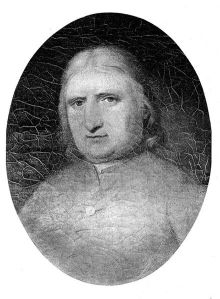
The key figure of the Quaker movement was the Christian-mystic, George Fox, who went about preaching a very flawed, yet empowered message concerning Christ. Fox’s message was instrumental in forming a zealous sect of men and women impassioned for the things of God, and yet stumbling profoundly in those things they eagerly sought. The events at Bristol and the apostasy of James Naylor (see I.B.2) revealed the inherent danger in presuming to walk in the mystical aspects of Christianity while poorly anchored to doctrinal truth and that truth underlying true spiritual experience and all true prophecy, ie. the testimony of Jesus Christ.
Fox’s autobiography describes a lengthy and painful struggle with truth in the years leading up to his ministry; a time of preparation before becoming empowered as a messenger. His early struggles no doubt formed within him a metal that allowed his ministry to take a stand against much opposition and public scorn. This spiritual metal likely stiffened the resolve of those that followed him into persecution. Fox describes bouts of dread and self-doubt arising later in his ministry as well, yet he states that through it all, God gave him the witness of his own salvation.
The first article of Subpart I.B was entitled The Mystical Wanderer, and dealt with the issue of Christian mysticism generally, as – to some extent – contemplating the laying aside of many common, natural, and apprehensible modes of operating in the world, in order to venture upon a painful process of truth-finding. In fact, this laying down of the apprehensible is a common aspect of the prophetic walk. The man or woman that would know God will become a wanderer in a world intent upon earthly drives and desires. Those called out (as God did Abraham) will ultimately find themselves to arrive at the place God has appointed them to be, guided only by a trust in God’s sovereign providence and mercy. These walk in darkness until the true light shines. But until that time comes, they do not entirely wander. For they have the lamp of God’s word for guidance:
Thy word is a lamp unto my feet, & a light unto my path. Ps. 119:105
This is the walk of faith, concerning which we read:
By faith Abraham, when he was called to go out into a place which he should after receive for an inheritance, obeyed; and he went out, not knowing where he went. Heb 11:8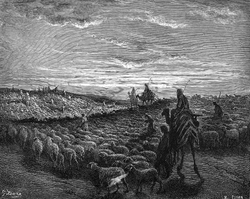
And so Abraham serves as an example of those that are called by God unto a salvation purchased for them by Jesus Christ, albeit incomprehensible. Implicit to this call, is that they commence upon a walk they do not understand; armed only with the promise of an eternal-inheritance. We are told to trust (as did Abraham) that God will bring us to that place through the gift of Himself. In so doing, we walk in an unknowing that can be perplexing and distressing, held by the hand of God through the ministrations of His Spirit. Those called unto salvation through election shall pass through times of trouble. They will experience losses of control. But they will be equipped with what God has provided them in the revelation of Himself up to that point. Therefore we read:
Now the just shall live by faith: but if any man draw back, My soul shall have no pleasure in him. But we are not of them who draw back unto perdition; but of them that believe to the saving of the soul. Heb 10:38-39
If there was no fearsome aspect to walking by faith, Scripture would not have to exhort us against “drawing back unto perdition.”
The Quakers arose during a time when much light had been restored in terms of true doctrine concerning the Person and work of Jesus Christ. What was lacking during the seventeenth-century was doctrine concerning the Spirit. Wesley’s movement would attempt this work in the following century, although it would know a greater success in restoring the doctrines concerning sanctification. Yet it was in this (ie. the realm of the Spirit) that Quakers attempted to walk. Certainly we may conclude they walked in some great extent in an area in which they had little light. 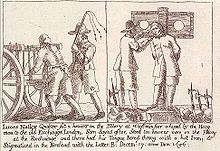 And yet, if the Bristol incident, the apostasy of James Naylor, and the storm of anti-Quaker resentment that broke across England be any indicator, the Quakers were not judged for light they did not have, but for light they did have, but neglected through failing to adhere to the restored orthodoxy of Protestantism that had enabled God to move His hand in power among them in the first place. Likewise, if we consider any substantial Christian movement that has left a damaged following in its train, we may discern the usual cause as the failure to adhere to the truth that went before. Quakerism shipwrecked much of itself upon the rock of failure to adhere to the reformed, Protestant orthodoxy. Just so, the Charismatic movement has shipwrecked much of itself upon the rock of failure to adhere to the Pentecostal orthodoxy that went before (to say nothing of its abuses of the reformed, evangelical, and holiness orthodoxies.)
And yet, if the Bristol incident, the apostasy of James Naylor, and the storm of anti-Quaker resentment that broke across England be any indicator, the Quakers were not judged for light they did not have, but for light they did have, but neglected through failing to adhere to the restored orthodoxy of Protestantism that had enabled God to move His hand in power among them in the first place. Likewise, if we consider any substantial Christian movement that has left a damaged following in its train, we may discern the usual cause as the failure to adhere to the truth that went before. Quakerism shipwrecked much of itself upon the rock of failure to adhere to the reformed, Protestant orthodoxy. Just so, the Charismatic movement has shipwrecked much of itself upon the rock of failure to adhere to the Pentecostal orthodoxy that went before (to say nothing of its abuses of the reformed, evangelical, and holiness orthodoxies.)
b. The Cause of Spiritual Declension; Want of Esteem for Revealed Truth
What was true for the early Quakers is true for us today. We are not judged for the light we do not possess. We are judged for the light we have. Jesus said:
And this is the condemnation, that light is come into the world, and men loved darkness rather than light, because their deeds were evil. John 3:19
Because the price of redemption is simply to believe and to confess the Lord Jesus Christ, true doctrine and orthodoxy concerning the same is to be cherished. Neither is doctrinal truth to be neglected for the sake of the mystical. The man that is willing to compromise principles of orthodoxy for the sake of supernatural experience loses hold of His Head (which is Christ) and will soon be adrift in a spiritual morass. He neglected the light revealed for the sake of a mystery hidden. But new light never comes through neglect or disservice to the light we already possess.
After his parable of the sower (whose seed perished by various means until finding good soil) Jesus told us that one would never cover a light with a basket. He then said:
“For nothing is secret, that shall not be made manifest; neither any thing hid, that shall not be known and come abroad. Therefore take care how you hear; For whoever has, to him shall more be given; and whoever does not have, even what he thinks he has shall be taken away from him.” Luke 8:17-18
Why does it matter “how we hear?” The Lord seems to be continuing upon His parable of the sower, wherein the word of God was snatched up by birds, or could not take root in the hard soil. The Word sown, is precious, and constitutes a form of “light.” For God speaks through His word! Otherwise we would not have the verse:
Thy word is a lamp unto my feet, & a light unto my path. Ps. 119:105
If God’s word is “light,” then we conduct ourselves in all things as if His word, and the apostolic doctrine was the truth. We honor, hold fast, and do according to what we hold true concerning God. If we do not receive the word of God as if it were the truth, and hold to it as if it were precious, it shall be taken away from us. We “buy the truth and sell it not.” What is the result for those that value the light they receive? More! More revelation. “Whosoever has, to him shall more be given.” Ultimately, it is darkness that shall condemn. But it will be a darkness self-imposed, through resisting the truth of God. There shall be agony upon the awareness of redemption’s loss; the terrible price for not valuing the truth of what God has done through His Son.
While it is possible to hold incorrect doctrine, while not rejecting light, there comes a point when the rejection of true doctrine does constitute a rejection of light; and that is when the rejection of true-doctrine turns constructively willful so as to become an affront to the Holy Spirit. He is called the Spirit of Truth. If we reject what our heart knows to be true, because it is too difficult to bear, we are resisting the Spirit of Truth. The Spirit of Truth will cease striving, and we will be given over to spiritual declension.
c. The Charismatic Movement as Doctrinal Declension
Our review of Church history related the slow progress of doctrinal truth over the centuries, until an event occurred on January 1, 1901 that signaled the restoration of the doctrine and experience of Pentecost. 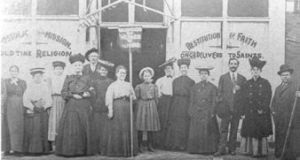 The restoration of the doctrine of Pentecost came with the restoration of the experience.
The restoration of the doctrine of Pentecost came with the restoration of the experience.
With the restoration of experience of things spiritual into the assemblies of the Christ-professing came an ever more vital need to adhere to the doctrinal truths that had gone before; those stood for by the reformers concerning the basis of our justification, the evangelical truths which followed the Reformation, the doctrines of sanctification and holiness which became the chief vehicle for true spiritual revival throughout the eighteenth and nineteenth-centuries, and the restored doctrine of Pentecost that had been spectacularly restored at Topeka and Azusa Street. As men are given more, more is expected. With more doctrinal truth comes more light into the Church. With more light there is increased opportunity to sin against Light.
The mid-twentieth-century was not a time when the Pentecostal movement was accepted.[1] Pentecost was a movement characterized by fervor for Jesus Christ, and which not only held a doctrine repugnant to the mainline denominations, but declared it assertively; the doctrine of Initial Evidence of the baptism of the Holy Spirit (See article I.G.3.) This was a doctrine the early Pentecostals suffered for in their private lives, just as other movements before them had held firm to a truth God had restored.
As the fire of early Pentecost wore off, the culture quickly swallowed up the true testimony along with the God fearing, Christ exalting Church. Nonetheless, God had restored a truth to the world which was vital for the entering-into of His kingdom; Truth which could be sought-for and experienced albeit under conditions increasingly hostile to the testimony of Christ and the sanctification of His elect. The brass-doctrines of Pentecost were not so faithfully held forth by a lukewarm and earthly-minded Church. They were too hard for respectable religion. With human concerns at the fore, the kingdom of God was less sought-after, as was the baptism of the Holy Spirit.
Rather than good news for the man of the world, the testimony of Jesus Christ cuts across earthly concerns. The Gospel of Jesus Christ cuts across all aspects of human life and human relationships. Jesus said:
“If any man come to Me, and hate not his father, and mother, and wife, and children, and brethren, and sisters, yea, and his own life also, he cannot be My disciple. And whosoever doth not bear his cross, and come after me, cannot be my disciple.” Luke 14:26-27
The Lord’s reply to the person who asked for leave to take care for his father until he died, was; “Let the dead bury their dead.” [2] Why would the Lord use such strong language as that we must “hate” family if we are to be His disciple? Recall the Lord’s words regarding service to two masters:
No man can serve two masters: for either he will hate the one, & love the other; or else he will hold to the one, & despise the other. Ye cannot serve God & mammon. Matt 6:24
While the context of that particular statement was worldly riches, the principle remains true for anything else that competes with God for our mind and heart. We shall always “hate” one of our masters. If we have fond desire for the world, it shall manifest in an aversion to the things of God, Who will not play “second” to the world for our heart. If we prefer family over the purposes of God in Christ, this will cause us to perceive the operations of God for our sanctification as intrusions and they will be resented. Therefore, we must clearly have our priorities in the things of the Spirit, rather than in the things of this world. When the Church tries to walk in spiritual things while having its priorities in the world, it becomes subject to lying spirits, deception, and is in danger of falling into God’s judgment. This is true on a personal level, and on a broader scale when assemblies, denominations, and movements begin to tailor doctrine to earthly priorities and worldly desires.
The Charismatic movement fell particular prey in this regard through its failure to adhere to the truth concerning the person and work of the Lord Jesus Christ and its neglect (if not always outright rejection) of the vital doctrinal truths that had been restored only decades before. By so doing, much of the movement fell into the vacant mysticism of operating in spiritual things without respect for, and increasingly aloof from Truth.
d. Replenished by Another Than Christ
Isaiah prophesies concerning the condition of the Church when spiritual things are operated-in aloof from the true testimony of Jesus Christ. We read:
Therefore Thou has forsaken Thy people the house of Jacob, because they be replenished from the east, are soothsayers like the Philistines, and they please themselves with the children of strangers. Is. 2:6
The Hebrew-word translated; “replenished”[3] (KJV) and “filled” (NASV) is the near-universal word translated; “to fill” in the KJV. It clearly means either; “to fill” or “to fulfill.” Perhaps then the best complexion of the statement would be something to the effect; because they are “fulfilled” or “completed” from the east. The Hebrew-word translated “east” is equally capable of being translated “ancient.” That the translators have chosen to state the matter as being “replenished” or “influenced” by the east, seems a decision arrived at given the context of the verse, ie. that God’s people are acting as “soothsayers” like the Philistines. However, mysticism might just as easily be described as an “ancient” or “old” practice, just as well as “eastern”. One speaks to origin in time, and the other to origin in place.
The Chaldeans were both an “ancient” people, and a people from the “east.”  It was from “Ur of the Chaldeans” that Abram was called out. Prior to the promises given to Abraham and prior to God calling the nation of Israel and imparting to them the law, and as far as we know, there was no establishment of God’s truth concerning His nature and His purposes in mankind. As such, religion was predominately a superstitious and mystical belief system and practice. What was lacking in religion prior to the calling out of Israel and establishing of the law? What made religion pagan? Simply, the lack of certain foundation truths concerning the nature and purposes of God; things revealed through the appearing of Christ.
It was from “Ur of the Chaldeans” that Abram was called out. Prior to the promises given to Abraham and prior to God calling the nation of Israel and imparting to them the law, and as far as we know, there was no establishment of God’s truth concerning His nature and His purposes in mankind. As such, religion was predominately a superstitious and mystical belief system and practice. What was lacking in religion prior to the calling out of Israel and establishing of the law? What made religion pagan? Simply, the lack of certain foundation truths concerning the nature and purposes of God; things revealed through the appearing of Christ.
Before that revelation of God came we find represented in the Abrahamic and Mosaic covenants, and ultimately, in the preaching of the Gospel in the first-century, there was profound ignorance in the earth concerning God. While this was certainly excusable in a time before truth was given, the continuation of pagan practices after the revelation of truth becomes a different matter, particularly when the issue is God’s people, who should know better! The fact that their practices resemble the practices of those that do not know God, makes their behavior much more detestable than if it were carried on by pagans. What is the source of this? For the pagans, the source is ignorance. For Israel, the source is ignorance as well. However it is an ignorance borne from disobedience to that which is known of God.
And so, the prophet declares that God’s people are “replenished from the east”. And whether “replenish” is the best rendering or not, the idea is certainly that their source and substance derives from another than Christ. Therefore the apostle tells us:
Beloved, do not believe every spirit, but test the spirits to see whether they are from God; because many false prophets have gone out into the world. I John 4:1
How do we “test the spirits”? Again, by their adherence to the truth concerning the person and work of the Lord Jesus Christ! When we fail to do this, we fall into a form of mysticism which appears to be what Isaiah’s prophecy is speaking of. This same Hebrew word translated “replenish” in the KJV is also translated the same way in Jeremiah’s prophecy:
For I have satisfied every weary soul, & I have replenished every sorrowful soul. Jer. 31:25
God is speaking of the time He will restore the captivity of Judah in holiness unto Himself. At that time He Himself will be the replenisher of the souls of His people. What would be the difference between being “replenished” by the Spirit of God, as opposed to being “replenished” by false spirits? The Spirit of God, as the promised “Comforter” will revive the soul that is weary and sorrowful. Why might the soul be weary or sorrowful? Because God’s process of bringing us nearer unto Himself and into His eternal kingdom through sanctification is distressing to the soul.[4] He wounds, but He also heals.[5] Furthermore, once a place of obedience is achieved, we begin to lay down our lives in ways that can be very painful were it not for the Divine comfort and presence of His Holy Spirit. Therefore throughout these workings of the Spirit of God, we also have His comfort, occurring almost hand-in-glove.
What about the false spirits? Do they replenish in the same way? Their work is to uphold the carnal man and to confirm him in his carnal mind! Therefore the spirit that replenishes the carnal mind is the spirit of this world which replenishes the carnal man with fresh hopes and fresh spirit catering to his own cravings, earthly desires, and prideful ambition.[6]
e. Israel as Influenced from the East
Isaiah’s prophecy indicts God’s people as being “replenished from the east.” We read that Abraham sent (not just Ishmael, but all) his natural children away so that they would not become an heir with his son, Isaac.[7] We read: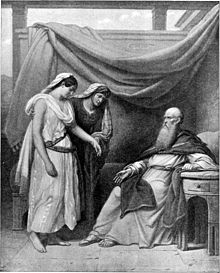
But unto the sons of the concubines, which Abraham had, Abraham gave gifts, and sent them away from Isaac his son, while he yet lived, eastward, unto the east country. Gen 25:6
This would seem to be an allusion to the divine gifts that are given to men by virtue of a profession of faith in Christ and entry upon the work of the Spirit. But if these be not heirs to the promise, they are sent away with gifts, and that, towards the east. The east alludes to things mystical, while lacking sound foundation in truth. Balaam was one of the great mystics from the east:
And he took up his parable, & said, “Balak the king of Moab has brought me from Aram, out of the mountains of the east saying, ‘Come, curse me Jacob, & come, defy Israel’.” Num 23:7
Mountains signify what is prominent or exalted. Balaam was notorious as moving in the power of God. Yet he fell into presumption, error, and judgment.
f. False Prophecy as Sorcery
Isaiah’s prophecy further indicts God’s people as “soothsayers like the Philistines.” The Hebrew word translated “soothsayers”[8] is also used as follows:
Is. 57:3 But draw hither, ye sons of the sorceress, the seed of the adultery and the whore.
Mic 5:12And I will cut off witchcrafts out of thine hand; and thou shalt have no more soothsayers.
Clearly, this word has a strong connection with witchcraft and Satanic practices and is therefore a terrible and stunning denunciation of Israel. How horrific is this thought, that the house of God could be a front for something of the occult! Therefore the prophet Jeremiah warns:
Therefore hearken not ye to your prophets, nor to your diviners, nor to your dreamers, nor to your enchanters, nor to your sorcerers, which speak unto you, saying, “Ye shall not serve the king of Babylon”, for they prophesy a lie unto you, to remove you far from your land; and that I should drive you out, and ye should perish. Jer. 27:9-10
The Lord appears to be classing the prophets in Jerusalem together with those who practice witchcraft. For they prophecy in the name of the Lord falsely. Given the context, they are even guided by a false spirit since the prophecies are not without design. For they are lying unto God’s people for the intended purpose they be driven out from the land of God’s blessing and perish!
How do such a things manifest in the Church? Through false teaching supported by false prophecy and false signs which undermine the purposes of God and run contrary to the testimony of Jesus. A false manifestation has the tendency to build up what God would tear down, and to tear down what God would build up![9] A spirit that is from God will direct us to the object of our faith, Jesus Christ, and those things attained for us in heaven that are eternal, e.g.; His righteousness, faith’s justification, sanctification, and a resurrection. A spirit that is not from God will direct us earthward, toward those things regarded and valued by the flesh; things temporal, in direct contradiction to the Word of God, which, after likening man’s flesh to the grass that withers and the flower that fades,[10] says: 
Lift up your eyes to the heavens, and look upon the earth beneath: for the heavens shall vanish away like smoke, and the earth shall wax old like a garment, and they that dwell therein shall die in like manner: but my salvation shall be for ever, and my righteousness shall not be abolished. Is. 51:6
g. Not Holding the Head
An orientation toward those things that shall “wax old like a garment” and which “shall die,” is a false orientation. How much worse, when the orientation is reinforced by doctrine itself. The Charismatic movement became the source of abundant false teaching, having its purpose in beguiling the Church away from the true object of its hope, and fixing its eyes upon the temporal. This mis-directing of the Church caused it to lose attachment to Christ. Recall that Paul spoke of the danger involved in chasing spiritual things in derogation of the truth:
Let no man beguile you of your reward in a voluntary humility and worship of angels, intruding into those things which he hath not seen, vainly puffed up by his fleshly mind, And not holding the Head, from which all the body by joints & bands having nourishment ministered, & knit together, increases with the increase of God. Col. 2:19
Christ is the head of the Church. The Holy Spirit is the agency uniting Christ with His body. When the Spirit-baptized begin to operate aloof from their supply in the Holy Spirit (Who is the Spirit of Truth) they lose their access to Christ. 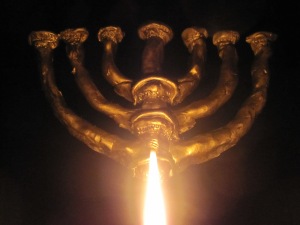 This role of the Holy Spirit to unite the witness of heaven (which is Christ) to the witness of earth (which is Christ in His Church) is typified in the feast of Pentecost, and is represented in the central shaft of the lamp-stand. This central shaft that unites the branches of either side is the Church’s vital connection to Christ. Thus it is through His Spirit that Christ is made real to our hearts unto sanctification. When another spirit is in operation, it will direct us away from eternal things and toward temporal things. Therefore John tells us:
This role of the Holy Spirit to unite the witness of heaven (which is Christ) to the witness of earth (which is Christ in His Church) is typified in the feast of Pentecost, and is represented in the central shaft of the lamp-stand. This central shaft that unites the branches of either side is the Church’s vital connection to Christ. Thus it is through His Spirit that Christ is made real to our hearts unto sanctification. When another spirit is in operation, it will direct us away from eternal things and toward temporal things. Therefore John tells us:
Beloved, believe not every spirit, but try the spirits, whether they are of God: because many false prophets are gone out into the world. – I John 4:1
We are to render discernment between a false spirit and God’s Spirit. Clearly, false spirits seek to access to the Church. False spirits will deceive through manifestations and signs. False spirits enter the Church via false prophets who disguise themselves as servants of Jesus Christ.
For such are false apostles, deceitful workers, transforming themselves into the apostles of Christ. II Cor. 11:13 
When the Church lacks the witness of the Holy Ghost through neglect and disservice to the testimony of Jesus Christ and disregard for the apostolic doctrines of the Church, but nonetheless pursues a semblance of godliness and presumes upon spiritual things, the Church begins to revert into a form of mysticism, wherein false spirits are allowed to influence, speak, and to manifest rather than the Holy Spirit. This occurs when the Church loses connection with her Head through a loss of the Holy Spirit’s agency in her midst. But the healthy body of Christ will have a secure connection to her Head through strengthening in the agency of the Holy Ghost within her:
…that He would grant you, according to the riches of His glory, to be strengthened with power through His Spirit in the inner man; so that Christ may dwell in your hearts through faith; and that you, being rooted and grounded in love, may be able to comprehend with all the saints what is the breadth and length and height and depth, and to know the love of Christ which surpasses knowledge, that you may be filled up to all the fullness of God. Eph. 3:16-19
[1] Indeed, true Pentecostalism is not accepted today.
[2] Matthew 8:22, Luke 9:60
[3] H4390 mâlê’ mâlâ’ maw-lay’, maw-law’ A primitive root, to fill or (intransitively) be full of, in a wide application (literally and figuratively): – accomplish, confirm, + consecrate, be at an end, be expired, be fenced, fill, fulfil, (be, become, X draw, give in, go) fully (-ly, -ly set, tale), [over-] flow, fulness, furnish, gather (selves, together), presume, replenish, satisfy, set, space, take a [hand-] full, + have wholly.
[4] Acts 14:22 “. . we must through much tribulation enter into the kingdom of God.”
[5] Deuternonomy 32:39 “. . I kill and I make alive; I wound and I heal. Neither is there any that can deliver from My hand.”
[6] I John 2:16 “For all that is in the world, the lust of the flesh & the lust of the eyes & the boastful pride of life, is not from the Father, but is form the world.”
[7] This seems to be an act of Abraham in further interest of the prophetic decree; Genesis 21:10 Cast out this bondwoman and her son: for the son of this bondwoman shall not be heir with my son, even with Isaac.
[8] (Strong’s No. 6049) meaning; to cloud over, act covertly, practice magic, soothsaying, sorcery
[9] See commentary on Micah 5:12 “& you will have fortune-tellers no more.”
[10] Isaiah 40:6-8

I was enlightened of the testimony of Jesus and accepted Him through water and spirit baptism July 15, 1981.
2:2 For I determined not to know any thing among you, save Jesus Christ, and him crucified.
The testimony of Jesus is lifted up in the lampstand model.
Col 1:16 For by him were all things created, that are in heaven, and that are in earth, visible and invisible, whether [they be] thrones, or dominions, or principalities, or powers: all things were created by him, and for him:
Rev 10:6 And sware by him that liveth for ever and ever, who created heaven, and the things that therein are, and the earth, and the things that therein are, and the sea, and the things which are therein, that there should be time no longer:
Bob, We must have been a part of the same move of God that was occurring about that time. I envy those that can state a date of their baptism in the Holy Spirit. I did not have the foresight to note the date the Lord baptized me, except to remember it was in the Spring of 1982. God bless.